A 30% increase in overdose deaths in 2020? Sure, the year of the pandemic. Most agree that isolation has been a huge causal factor, but what does isolation mean in a world patched together by social media? Rat Park and Social Baseline Theory help us see the full picture.
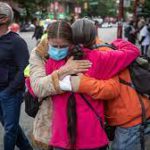 Over the last few months there have been numerous reports of a sharp rise in overdose deaths in 2020. Most recently (last month) the National Center for Health Statistics reported an increase of 21,000 (almost 30%) — totaling 93,000 deaths in one year. Virtually all experts associate this increase with the pandemic. Many reasons are aired: stretched health-care facilities, less access to naloxone, less access to doctors, housing issues, and…increased isolation.
Over the last few months there have been numerous reports of a sharp rise in overdose deaths in 2020. Most recently (last month) the National Center for Health Statistics reported an increase of 21,000 (almost 30%) — totaling 93,000 deaths in one year. Virtually all experts associate this increase with the pandemic. Many reasons are aired: stretched health-care facilities, less access to naloxone, less access to doctors, housing issues, and…increased isolation.
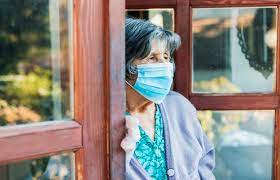 The experts agree that isolation’s been a major concern. Yet our understanding of the nature of isolation is superficial. Since almost everyone has been on social media this year, madly zooming away the hours, what does it actually mean to be alone, physically, bodily, especially for people living alone, each in their own little box?
The experts agree that isolation’s been a major concern. Yet our understanding of the nature of isolation is superficial. Since almost everyone has been on social media this year, madly zooming away the hours, what does it actually mean to be alone, physically, bodily, especially for people living alone, each in their own little box?
We know that isolation makes people more vulnerable to depression. Loneliness = depression. And depression is the gateway to more extreme drug use. But while living in states of lockdown, we’ve spent the year zooming, texting, chatting, tweeting, emailing, Whatsapping, posting to Instagram, following on Facebook… Don’t these explicitly social activities dispel isolation and defeat loneliness? It certainly helps to connect with people any way we can. But flat screens have their limits. They don’t allow for the spontaneity and ease, the free flow of real conversation, the richness of body language, the way people position themselves, move their heads, their feet, their eyes, when they’re actually, physically together. Never mind pheromones and oxytocin — the good odours that humans exude. So…some degree of closeness must remain out of reach. Maybe a large degree.
What kind of closeness do we humans need in order to feel connected, supported, safe — and free of addiction? Two research programs 30 years apart tell the story.
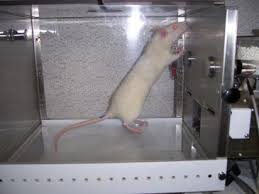 The first is Rat Park. Most of you are familiar with Bruce Alexander’s research in the 70s and 80s, memorialized in the addiction world as “Rat Park.” These studies showed that isolated rats (kept alone in their cages) chose to drink water laced with drugs like morphine, while those allowed to socialize, cuddle, and have sex in a park-like (for rats) environment avoided the drug solution and drank plain water instead. There are
The first is Rat Park. Most of you are familiar with Bruce Alexander’s research in the 70s and 80s, memorialized in the addiction world as “Rat Park.” These studies showed that isolated rats (kept alone in their cages) chose to drink water laced with drugs like morphine, while those allowed to socialize, cuddle, and have sex in a park-like (for rats) environment avoided the drug solution and drank plain water instead. There are 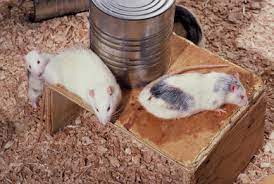 thousands of references to Rat Park online (e.g., here), and Alexander’s own site summarizes the findings and extends them with a whole philosophy on what drives addiction. One of Alexander’s reflections captures the main lesson: “Solitary confinement drives people crazy; if prisoners in solitary have the chance to take mind-numbing drugs, they do.”
thousands of references to Rat Park online (e.g., here), and Alexander’s own site summarizes the findings and extends them with a whole philosophy on what drives addiction. One of Alexander’s reflections captures the main lesson: “Solitary confinement drives people crazy; if prisoners in solitary have the chance to take mind-numbing drugs, they do.”
But does verbal communication alleviate the damage done by solitary housing? Rats aren’t verbal. When they socialize, they cuddle, play, lick, fondle and fuck. We’re mammals too. How much does verbal communication satisfy our needs?
The second research program has come to be known as Social Baseline Theory (SBT). Starting in 2006, James Coan and colleagues studied the effects of hand-holding on the activation of brain structures responsible for coping with stress. 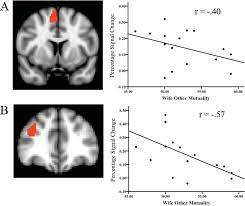 Subjects inside a brain scanner (fMRI) held hands with either a marital partner, a friend, or a stranger positioned outside the scanner. When exposed to (mild) electrical shocks (psychologists’ favourite way to induce stress) these brain structures showed less activation (they were less “aroused”) when the subject was able to hold hands, even with a stranger. In a review of these studies, Coan had this to say:
Subjects inside a brain scanner (fMRI) held hands with either a marital partner, a friend, or a stranger positioned outside the scanner. When exposed to (mild) electrical shocks (psychologists’ favourite way to induce stress) these brain structures showed less activation (they were less “aroused”) when the subject was able to hold hands, even with a stranger. In a review of these studies, Coan had this to say:
“According to SBT, the human brain assumes proximity to social resources—resources that comprise the intrinsically social environment to which it is adapted… At its simplest, SBT suggests that proximity to social resources decreases the cost of climbing both the literal and figurative hills we face, because the brain construes social resources as bioenergetic resources, much like oxygen or glucose.”
The SBT experiments add an critical layer to what we know of isolation and stress: human proximity is processed by the brain as a physical, visceral presence. Other people are recognized by the brain not just via images on a screen or words packed in sound waves, but through actual physical closeness, optimized by the sense of touch. Even being in the same room as others, being close by, provides a fundamental context — a baseline — for handling adversity and stress. Think of being in a movie theatre, a waiting room, or in your own den watching TV with someone else. No speech is required to feel the irrepressible sense of closeness that comes with proximity itself.
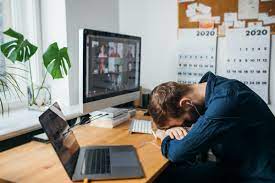 I hear my friends and family talking about “Zoom fatigue.” For a reason. Zooming is way way better than no communication at all. But it’s still a partial measure. Texting, Tweeting, Instagram, and other platforms that rely (at least partially) on written characters provide even less of the colour, or tone, or the physicality of mammalian communication. Our brains are full of semantics, words and ideas, and we love exchanging these, exploring and building on them. That’s great. But our brains are part of our bodies, so the sense of comfort and care we get from others comes from an evolutionary heritage tens of millions of years old. A heritage that’s primarily nonverbal.
I hear my friends and family talking about “Zoom fatigue.” For a reason. Zooming is way way better than no communication at all. But it’s still a partial measure. Texting, Tweeting, Instagram, and other platforms that rely (at least partially) on written characters provide even less of the colour, or tone, or the physicality of mammalian communication. Our brains are full of semantics, words and ideas, and we love exchanging these, exploring and building on them. That’s great. But our brains are part of our bodies, so the sense of comfort and care we get from others comes from an evolutionary heritage tens of millions of years old. A heritage that’s primarily nonverbal.
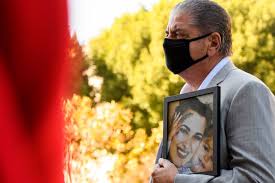 Even with all the digital media at our disposal, it’s been a lonely year. And that 30% increase in overdose deaths counts as a reflection of how hard it’s been for many of us. We seem to be starting to conquer Covid-19, at least in the Western world. Let’s keep it up, and let’s spread the wealth. That includes getting vaccinated, so we can protect our families and communities while protecting ourselves. It’s gotta be a group effort, and the group includes humans everywhere. People like us, all over the world, who need to come out of hiding.
Even with all the digital media at our disposal, it’s been a lonely year. And that 30% increase in overdose deaths counts as a reflection of how hard it’s been for many of us. We seem to be starting to conquer Covid-19, at least in the Western world. Let’s keep it up, and let’s spread the wealth. That includes getting vaccinated, so we can protect our families and communities while protecting ourselves. It’s gotta be a group effort, and the group includes humans everywhere. People like us, all over the world, who need to come out of hiding.
 Informed by unparalleled neuroscientific insight and written with his usual flare, Marc Lewis’s The Biology of Desire effectively refutes the medical view of addiction as a brain disease. A bracing and informative corrective to the muddle that now characterizes public and professional discourse on this topic.” —Gabor Maté, M.D., author of In The Realm of Hungry Ghosts: Close Encounters With Addiction
Informed by unparalleled neuroscientific insight and written with his usual flare, Marc Lewis’s The Biology of Desire effectively refutes the medical view of addiction as a brain disease. A bracing and informative corrective to the muddle that now characterizes public and professional discourse on this topic.” —Gabor Maté, M.D., author of In The Realm of Hungry Ghosts: Close Encounters With Addiction
The effect that wearing masks and social distancing and avoiding physical touch or hugs also helps us understand why the death rate is so high. I am a feely touchy kind of person so the wearing of masks and avoiding close contact leaves me feeling isolated even though there might be people all around me.
Thanks for extending these ideas about the physical nature of connection. I’ve also missed hugs from friends and relatives. Seemed like something of a glass wall between us. Toronto is finally out of lockdown, and the surging crowds in parks and restaurant patios feels like the return of life itself.
This is a great article, though its reason saddens me. I’m a homebody, and self-isolate anyway, but the lockdowns got to me. Because I don’t often talk about my addiction story, I depend on the closeness I have with family and friends, to keep me sane. We hug a lot, squeeze shoulders, kiss cheeks, hold hands. I refused to let anyone take that away from me. I moved from West coast to East coast, just to help my elderly aunt cope during the lockdowns. There was no way I wasn’t going to hug her. She, too, struggled with the isolation, though. Even having 30 years sober under her wing. None of us were meant to be alone, without support, without touch, without intimacy. We can’t live without it. I know I can’t. My heart goes out to all the lives lost, and their families. Thank you for sharing this post. It makes me want to hug my family even more. Reading your posts have helped me tremendously.
Hi Tracy. Thanks for your warm and expressive comment. What you’re saying here really resonates with my experience during lockdown. I also had an aunt who suffered a great deal because she was isolated in her room in a high-end nursing home with very strict Covid policies. I felt torn between my wish to see her and the stark warnings I got from those around me — well-meaning but also self- rather than other-focused. With several other lonely people as well, this was a real conflict for me.
I did do some visiting that wasn’t formally sanctioned, but I wish I’d done more. I admire your refusal to submit to excessive caution at the expense of care for others. Obviously caution has been very important during the crisis. But sometimes human needs require a more nuanced response than any formal policy can dictate.
I just read the post on ‘good’ vs ‘bad’ drugs and wanted to share a thought on the role of nutrition in regard to people feeling they need to medicate or not. Specifically the benefits of high doses of omega-3s from fish oil, 3 or 4 grams a day. There’s a psychiatrist and biochemist named Joseph Hibbeln who has been studying it for many years and he thinks it’s essential for mental health. It supposedly plays a role in dopamine production. There’s at least one video on youtube of him talking about the research.
Last year I was treated for a complex medical condition that put me in contact with an estimated 500 masked medical professionals. If I was to pass a single one of them on the street today I wouldn’t recognize a single one of them. Bizarre.
One benefit of having someone else nearby is that if you accidentally overdose, they can give you Narcan. Surely some of the increase in fatal ODs is due to a greater than usual chance of using alone during this pandemic. All of the other social deprivation effects discussed here are adding to what would already be an increase in ODs (due to using alone).
Yes! Overdoses are far more likely when people use alone. For that very reason, as well as the possibility of calling for help.
It’s been a very tough time for us humans: social distancing, major events cancelled, masks, constant hand sanitising and elbow bumps.
One thing you didn’t mention was how phone calls can help. They’ve helped me through it all, I hear the warmth of the voice, the emotions, the stories. When I couldn’t meet others, at least I could call them.
Most people want to avoid anyone in active addiction/substance misuse. The truth is that we need people MORE during this phase, (for many, addiction coincides with very challenging periods in our lives: economic, relational and even spiritual), not less. That’s why I’l keep supporting people quitting drinking (online, so safe) because we all need encouragement to make and sustain big life changes.
Hi Annettte. Yes, the warmth of the voice makes a big difference, to me as well. It’s a whole different dimension than text on a screen. Thanks for that reminder. And what you say about people in active addiction is certainly true.
Marc,
I cannot believe you are so stoned as to mRNA vaxx☠️. What horrible advice.
I’ll leave that for other readers to respond to, if anyone cares. To me it’s a no-brainer.
The return to some face to face contact and hugs, actual touching and putting arms around people(besides my partner) has been an elixir for me. I’ve always been pretty physical in my interactions with other people. A 12 Step sponsor once called me a fearless hugger: I’d walk up to even the most prickly newcomers and ask if I could hug them;) Hugging is like a noncompetitive contact sport: can I get a hug outa this person? Will they like it? How long can we hang on before it gets weird?
Even before I’d learned about Bruce’s Rat Pack, I’ve been convinced that most of us are seriously touch-deprived, hungry to be seen, witnessed, known in our messy, beautiful humanity. And here we go, back into our masks again, with the surge in variant cases… ah well, I look forward to coming out the other side again, while settling for kissing people through the Zoom screen in the meantime.
Sweet comment. Makes me think of Hug Reduction as analogous to Harm Reduction… A way to survive with needs only partially fulfilled. Much easier than total abstinence!
So much better, yes.
Thanks for an interesting post Marc. I’d like to point out that explicitly social media isn’t really all that social. The kind of interaction it promotes is quite one-sided. Often, especially for people who may be vulnerable to feelings of loneliness or some kind of disenfranchisement, it can have the opposite effect, that is, those who can do (such as go out and have a nice meal), versus those who can’t. I remember reading ages ago that social media such as Facebook is really teaching us how to be lonely, not how to be alone. I stopped looking at Facebook for that very reason. It’s okay to be alone.
I became mentally ill about four years ago, and found 2020 a little easier to weather than many, simply because the opportunity for a lot of social interaction had already diminished in the previous years as friends disappeared, unable to cope with my illness. It was interesting talking to a couple of people who had strong levels of direct social interaction prior to 2020. They did not cope well under lockdown.
Could I also just précis my understanding of SBT as you’ve explained it, just so I know I’ve got my understanding right? I’ll put it this way, I found it much easier to establish an exercise routine to lose weight when I did it in partnership with someone else, that is, it was much easier to do when the actual work (the exercise) became secondary, and the social element overrode the actual task?
Thanks for a very interesting comment, Christopher. This does indeed put social media in more precise perspective. Yes, it can be lonely! Makes me think of a kid watching others interact while sitting at the side of the room with nothing to say.
Also interesting that people who are or need to be more plugged in socially are most at risk when they have to depend on their screens.
As for SBT, I haven’t followed it closely, but the research made a big splash about 10-15 years ago and people still talk about it. I think the message is very general: especially in stressful circumstances, the sense of another’s support or closeness has clear effects on how we feel and how our brain’s regulate how we feel. It’s not such as surprising finding — common sense perhaps. But these guys watched changes in brain function in a scanner while touch was present vs. absent. Kind of a cool paradigm.
I think that, as mammals, we all need and rightly crave being part of a family, and a group. Sometimes several groups. That expands our minds and our identities, not as something to boast about, but something and somewhere to find ourselves ACCEPTED. I struggled for many years to find home, partly because we’d had such a disconnected childhood. Later, that morphed into addiction and then mental illness. Open Dialogue therapy helped me enormously, to realise that I was – and AM – worthy, despite all my wounds and messiness.
Or should I say, BECAUSE of my wounds and messiness. The messy me welcomes the messy you, because imperfection is the name of the game! Phone calls, walks, trips out (photos of views, not food!) and animals all help the ancient mammal residing within us……
Thanks for the reminder. We ARE messy, but a resolute part we’ve inherited from our parents (who inherited it from their parents) tries ceaselessly to make us neat, clean, proper, well-behaved. Reconciling these needs, whether via IFS or Open Dialoge or whatever, helps enormously when it comes to comforting ourselves.
Oh…this. I just came away from Twitter; the first two posts I saw were from people who’d just lost a son, and a nephew, to overdose.
Isolation kills; of that there’s no doubt (It’s a favoured tactic of humans who torture other humans). Nowadays, many of us are reeling around like asteroids without stable ‘orbits’ of relation, and this long isolation exacerbates that wound to an intolerable extent. So many people are estranged, dislocated, displaced, homeless, displaced…and grabbing for anything that will simulate relation and contact. (Recently, of addiction, I had a thought: “If we don’t have someone to bond with, we’ll bond to something.”)
I learned recently of a practice that some ICU nurses invented to give COVID patients an approximation of touch: They fill surgical gloves with warm water, and lay them gently underneath, or on top of, the hands of isolated patients. The gloves became known as “the hand of God.” I wept, reading about this practice…
We’re immersed in touch as we gestate; we’re born to need touch as our primary focal point of safety, stability, sustenance, and sanity. I imagine we’re all familiar with the cruel studies and circumstances (Harlow’s monkeys, orphans in Romania, etc.) that slam home the truth of touch and steady, loving presence.
No wonder the prevalence of deaths through overdose and suicide. We are dying of loneliness, of mammalian heartbreak.
I understand loneliness, addiction, derangement now like never before. Nearly all of my beloved ones have died or live very far away. This long isolation?…I call it “learning to tolerate the intolerable.” (I live with several autoimmune diseases, so I am mostly at home; my mate works long hours, and both of our cats died in the last year. So far, we haven’t been claimed by any new critters…I’m dreaming of buoyant dogs and beloved cats constantly…)
Screens are, at best, a superficial panacea for what we truly long for. I’m grateful for the technologies that help us to see and talk with one another…and they’re no replacement for that primary sustenance of actual presence…The touch, scent, sound, and living pulse of another being, of beloved presence.
A gift of this time?…We are beginning to soften in our attitude towards loneliness, beginning to be kinder to one another about its prevalence, judging less and understanding more deeply…
We thrive in relation…It’s home.
May we all know this…sense this…live in its sustenance…be immersed in the elixir of it (as Joanna writes above).
Thank you all, for this conversation. May you hold, and be held, in love.
Marc I’ve just finished Memoirs and your story parallels mine to a tee. I’m in my third year of recovery and your words rang so true for me. I had to reread sections to be certain I wasn’t the writer. I am waiting for the next book to arrive.
Thank you.
Hi John. Sorry I missed this comment earlier. I wish you a story line that resolves sooner than mine did. It took me such a long time to finally outgrow that crazy love affair with opiates. I hope you’re continuing to do well. Life is plenty interesting without all that drama!
Very best,
Marc